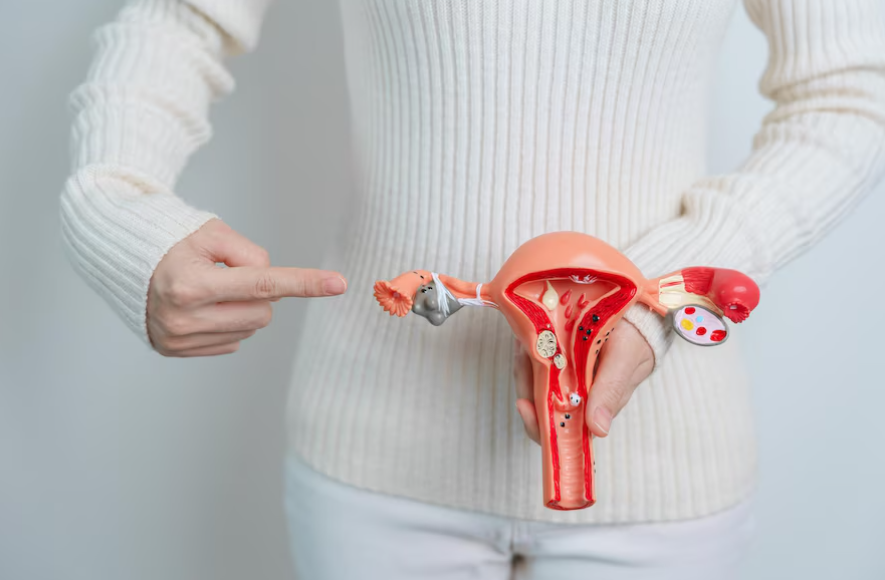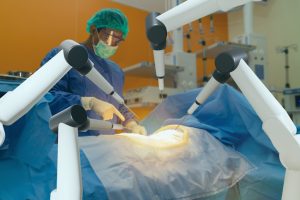Uterine fibroids, also known as leiomyomas or myomas, are noncancerous growths that commonly develop in the uterus during childbearing years. While these growths do not typically increase the risk of uterine cancer, they can cause significant discomfort, heavy menstrual bleeding, and other symptoms that can adversely affect a woman’s quality of life.
Symptoms and Diagnosis
The symptoms of uterine fibroids can vary widely based on their size, number, and location within the uterus. Common symptoms include:
- Heavy menstrual bleeding: Prolonged or abnormally heavy periods.
- Pelvic pain and pressure: Discomfort or pressure in the pelvic region.
- Frequent urination: An increased need to urinate.
- Constipation: Difficulty with bowel movements.
- Backache or leg pains: Pain in the lower back or legs.
Diagnosis typically involves a combination of pelvic exams, ultrasound imaging, and other diagnostic tools such as MRI or CT scans to determine the presence, size, number, and location of fibroids.
Treatment Options
Dr. Shweta Mendiratta’s Approach
Dr. Shweta Mendiratta, a specialist in the treatment of uterine fibroids, emphasizes a holistic approach that targets the root causes of the condition. Her treatment strategy includes:
- Nutrition: A diet rich in fruits, vegetables, whole grains, and lean proteins can help manage fibroids. Dr. Mendiratta advises reducing the intake of processed foods, sugar, and caffeine, which can worsen symptoms.
- Lifestyle Modifications: Regular exercise and stress-reduction practices like yoga or meditation can improve overall well-being and alleviate fibroid symptoms.
- Herbal Remedies: She integrates herbal supplements and traditional remedies tailored to individual needs, such as chasteberry, turmeric, or ginger, which have anti-inflammatory and hormone-balancing effects.
Medical Interventions
Several medical interventions are available to manage uterine fibroids:
- Medication: Hormonal treatments, including birth control pills or GnRH agonists, can help regulate menstrual cycles and reduce symptoms.
- Minimally Invasive Procedures: Techniques such as uterine artery embolization (UAE) or focused ultrasound surgery (FUS) can reduce the size of fibroids without major surgery.
- Surgical Options: For larger or more problematic fibroids, surgical options like myomectomy (removal of fibroids) or hysterectomy (removal of the uterus) may be necessary.
Finding a Uterine Fibroids Treatment Doctor in Faridabad
If you are seeking specialized care for uterine fibroids in Faridabad, it is crucial to select a knowledgeable and experienced healthcare provider. Dr. Shweta Mendiratta is a prominent expert in the field, offering compassionate and personalized treatment plans tailored to each patient’s unique needs.
Dr. Shweta Mendiratta’s holistic approach and dedication to patient care have earned her a reputation as a trusted authority in the treatment of uterine fibroids. Patients can expect thorough evaluations, customized care, and continuous support throughout their treatment journey.
Conclusion
Uterine fibroids can significantly impact women’s health and quality of life, but effective treatments are available. By adopting a holistic approach that addresses the underlying causes of fibroids, women can find relief from symptoms and enhance their overall well-being. With the expertise of professionals like Dr. Shweta Mendiratta, patients can confidently navigate their path to better health.
FAQ
Q: What are uterine fibroids?
A: Uterine fibroids, or leiomyomas/myomas, are noncancerous growths in the uterus, common during childbearing years. They can vary in size, number, and location.
Q: What are the symptoms of uterine fibroids?
A: Symptoms may include heavy menstrual bleeding, pelvic pain and pressure, frequent urination, constipation, and back or leg pain. The severity depends on the fibroids’ size and location.
Q: How are uterine fibroids diagnosed?
A: Diagnosis involves pelvic exams, ultrasound imaging, and possibly MRI or CT scans to assess the fibroids’ characteristics and determine the best treatment approach.
Q: What treatment options are available?
A: Treatments range from hormonal medications and minimally invasive procedures to surgical interventions like myomectomy or hysterectomy, depending on the fibroids’ severity.
Q: How can I find a uterine fibroids treatment doctor in Faridabad?
A: Research healthcare providers specializing in gynecology with experience in fibroid treatment. Dr. Shweta Mendiratta is a well-respected expert in Faridabad, known for her holistic and personalized approach.
Q: What is Dr. Shweta Mendiratta’s approach to uterine fibroids treatment?
A: Dr. Shweta Mendiratta’s holistic approach includes nutrition counselling, lifestyle modifications, herbal remedies, and various medical interventions to address the root causes of fibroids and provide effective treatment.





